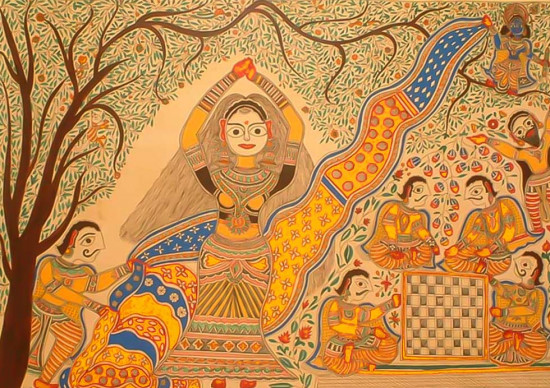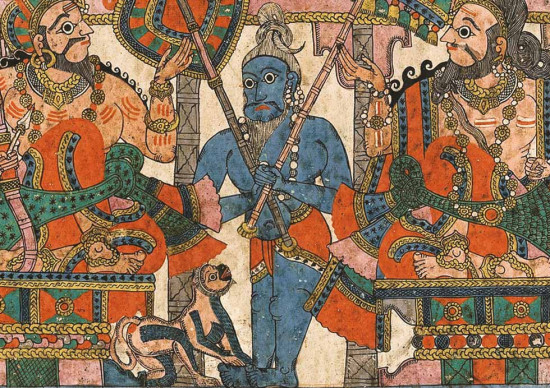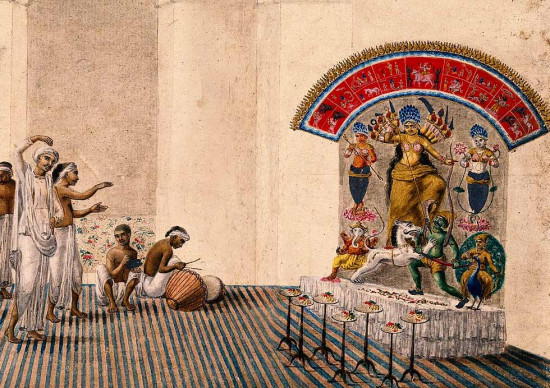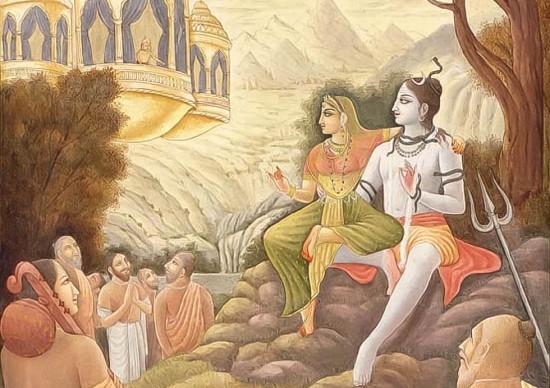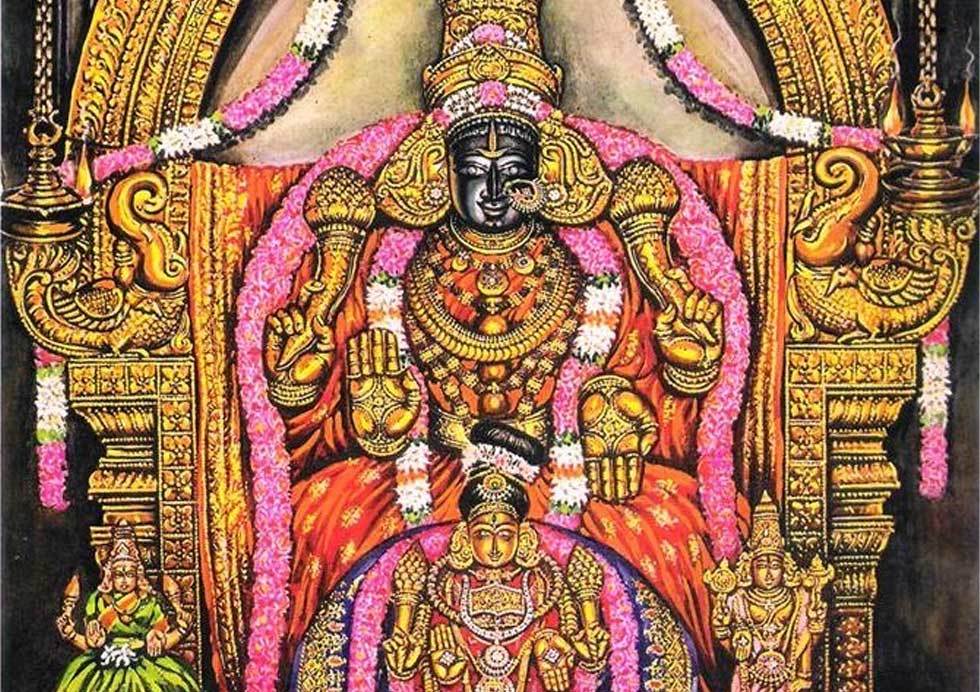
In Sri Vaishnavism, Shri Vishnu Priya Mahalakshmi Devi is honored as the supreme goddess and the complete embodiment of Shakti. Sri Vaishnavism teaches us to respect Mata Bhagwati Shri Lakshmi just as much as we honor Shri Narayana. They are two parts of the same divine.
The entire Shri Suktam is dedicated to beloved Shri Devi, celebrating her importance in our lives. As the divine consort of Lord Vasudeva, she is the supreme mother of all worlds, nurturing and caring for all beings.
Known by names like Jagatmata, Mahamaya, and Jagadishwari, she represents love, strength, and protection. By honoring her, we recognize her vital role in the universe and our deep connection to her as the source of wisdom and guidance in our spiritual journeys.
The entire Shri Suktam is dedicated to beloved Shri Devi, celebrating her importance in our lives. As the divine consort of Lord Vasudeva, she is the supreme mother of all worlds, nurturing and caring for all beings.
Known by names like Jagatmata, Mahamaya, and Jagadishwari, she represents love, strength, and protection. By honoring her, we recognize her vital role in the universe and our deep connection to her as the source of wisdom and guidance in our spiritual journeys.
Sri Vaishnavism
Sri Vaishnavism, a revered denomination within the broader Vaishnavism tradition of Hinduism, predominantly flourishes in South India. Named after Goddess Lakshmi, also known as Sri, and Lord Vishnu, this tradition intertwines their sacred reverence. Its roots extend deep into the ancient Vedas and Pancharatra texts, gaining prominence through the heartfelt hymns of the Alvars, captured in the Naalayira Divya Prabandham. Traditionally attributed to the 10th-century sage Nathamuni, the philosophical foundation was solidified by the influential thinker Ramanuja in the 11th century, who articulated the principles of Vishishtadvaita, or qualified non-dualism. Over time, Sri Vaishnavism branched into two primary sects in the 16th century: the Vadakalai, which emphasizes the authority of the Vedas, and the Tenkalai, which honors the Naalayira Divya Prabandham. Within this vibrant tapestry, the Telugu Brahmins, known as Andhra Vaishnavas, maintain a distinct identity, united in their devotion without division into these sects. This rich tradition continues to inspire deep reverence and devotion among its followers, celebrating the divine connection between the individual soul and the Supreme.

Vaikuntha Kamalaja: Sri Lakshmi and Vishnu
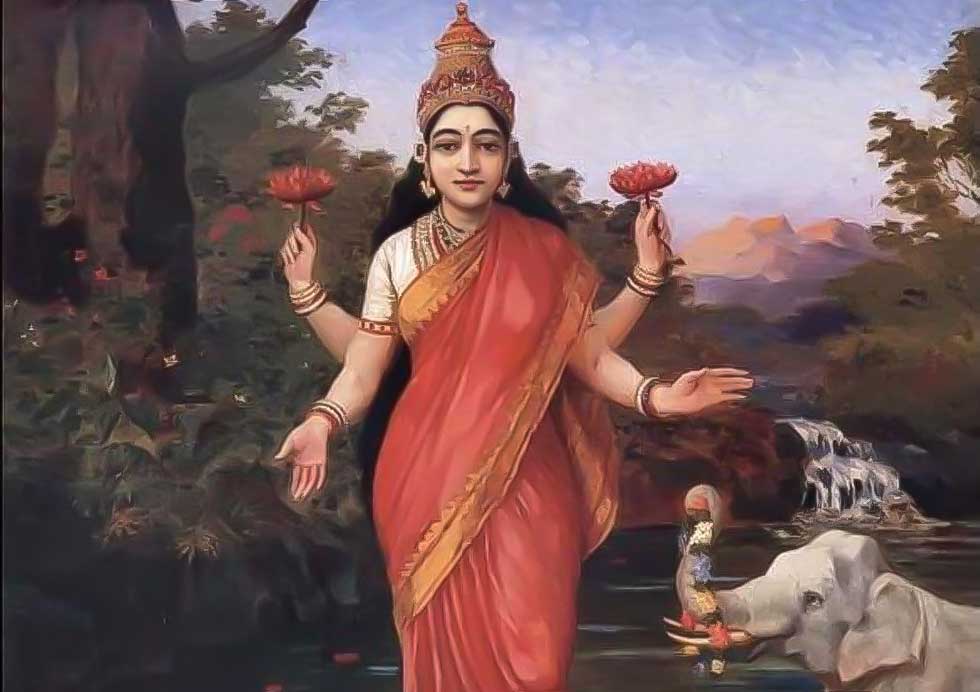
Maa Lakshmi is revered as the supreme goddess in Vaishnavism. Her name, Lakshmi, signifies her role in helping us reach our goals, or "Laksh," which ultimately leads us to the lotus feet of Lord Narayan (Vishnu). She embodies the divine energy of Narayan and is his eternal and beloved consort. Lord Vishnu holds her close to his heart, where she resides as the sacred Shrivatsa mark. This beautiful connection reflects their unity and the blessings she bestows upon all who seek her grace, guiding them on their spiritual journey.
We always invoke the name of Maa Lakshmi before addressing Bhagwan Vishnu. We say "Shri" Vishnu, "Shri" Hari, "Shri" Narayan, and "Shri" Bhagwan, recognizing her divine presence. Maa Lakshmi is the Vaishnavi of Vishnu, the Narayani of Narayan, the Bhagwati of Bhagwan, and the Jagatmata of Jagatpita. She is the Mahavaishnavi of Mahavishnu and the Shri of Shriman, embodying the essence of divine energy.
Some may say that while Goddess Lakshmi represents wealth, Lord Narayan remains untouched by material possessions, keeping wealth at his feet. Such statements can undermine the reverence we hold for Maa Lakshmi. In truth, she is not only the goddess of wealth but also the very Shakti of Narayan.
Maa Lakshmi has a special fondness for the lotus, which thrives in muddy waters yet remains untainted. This reflects her love for those who, despite living in the material world, remain unaffected by it. However, just as a lotus needs mud to grow, we too require some material wealth to sustain our lives. Maa Lakshmi grants us wealth so we can serve her and reach her lotus feet. Yet, we must remember not to become attached to material riches; like the lotus, we should thrive amidst the challenges of life without losing our connection to the divine. Only then will we truly become her beloved children.
Lakshmi Devi The Goddess of Wealth
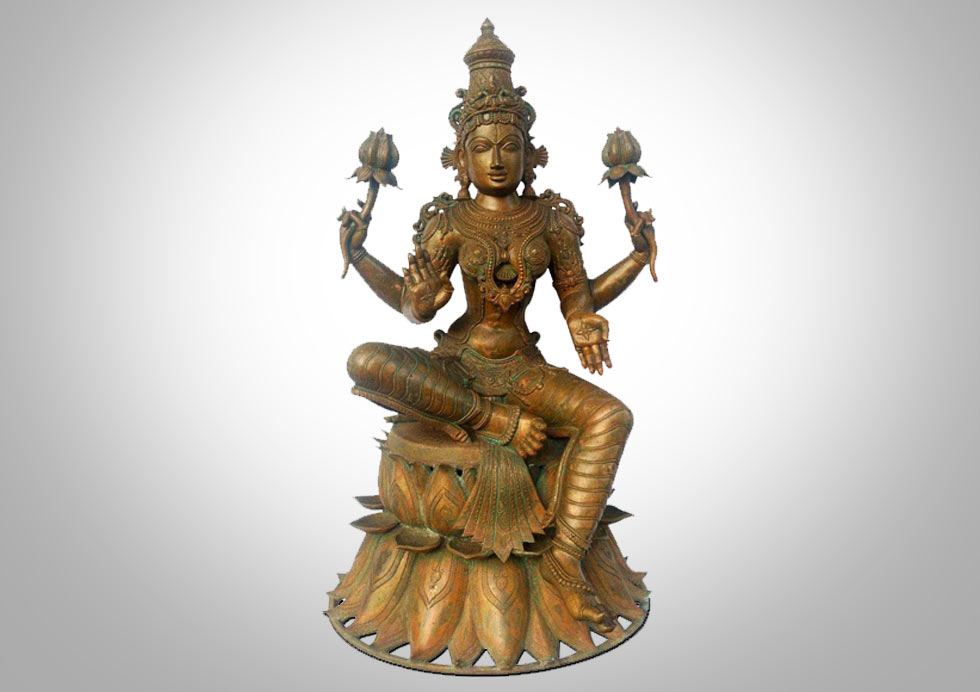
Lakshmi is the goddess of wealth, prosperity, and abundance in Hinduism. She is the consort of Mahavishnu. She not only gives material wealth to her devotees but also the richness of the spirit and the blessings of good fortune.
Lakshmi Devi is typically depicted as a beautiful woman, adorned in rich garments and gracefully seated on a lotus flower. In her four arms, she holds various things. In Hinduism devi Lakhsmi has eight forms, you can read iconography of devi lakshmi here.
Lakshmi Devi is lovingly worshiped during Diwali, a time when devotees seek her blessings for wealth and prosperity in the year ahead. She is also closely associated with Shakti, the divine feminine energy that sustains and nurtures the universe, highlighting her vital role in both material and spiritual abundance.
Lakshmi Devi is typically depicted as a beautiful woman, adorned in rich garments and gracefully seated on a lotus flower. In her four arms, she holds various things. In Hinduism devi Lakhsmi has eight forms, you can read iconography of devi lakshmi here.
Lakshmi Devi is lovingly worshiped during Diwali, a time when devotees seek her blessings for wealth and prosperity in the year ahead. She is also closely associated with Shakti, the divine feminine energy that sustains and nurtures the universe, highlighting her vital role in both material and spiritual abundance.
Lakshmi Devi Shakti of Sri Vishnu in Puranas
Lakshmi devi is deeply revered in Hinduism as the consort of Lord Vishnu and the Mother of the Universe. Texts like the Vishnu Purana and Padma Purana emphasize her omnipresence, highlighting that she is inseparable from Vishnu. She embodies wealth, satisfaction, and cosmic support, illustrating how the male and female aspects of the divine are interconnected. Across various scriptures, including the Garuda and Skanda Puranas, Lakshmi devi is honored not only as a source of material prosperity but also as the embodiment of wisdom and compassion, guiding devotees toward spiritual fulfillment and harmony in their lives.
Lakhmi devi in Vishnu Purana
In the Vishnu Purana, Chapter 8, it says that Lakshmi, the Mother of the Universe, is always by the side of Vishnu. Just as Vishnu is everywhere, so is Lakshmi. She represents creation, while Vishnu is the creator. He supports the universe, and she is like the Earth. Where there is happiness from Vishnu, there is satisfaction from Lakshmi.
Vishnu Purana Part 1 Chapter 8:
नित्यैवैषा जगन्माता विष्णोः श्रीरनपायिनी। यथा सर्वगतो विष्णुस्तथैवेयं द्विजोत्तम ॥17
She(Laxmi), the Mother of the Universe, is the eternal companion of Vishnu. Just as He is omnipresent, so is She.
स्रष्टा विष्णुरियं सृष्टिः श्रीर्भूमिर्भूधरो हरिः। सन्तोषो भगवाँल्लक्ष्मीस्तुष्टिर्मैत्रेय शाश्वती ॥19
He is creator, She is creation; He is the supporter, She is the Earth; He is happiness, She is satisfaction.
You (Śrī) are the mother of all the worlds. Hari, who is the Lord of all the gods, is the father.
You (Śrī) are the mother of all the worlds. Hari, who is the Lord of all the gods, is the father.
Lakshmi Devi in Garuda Purana Moksha Khanda
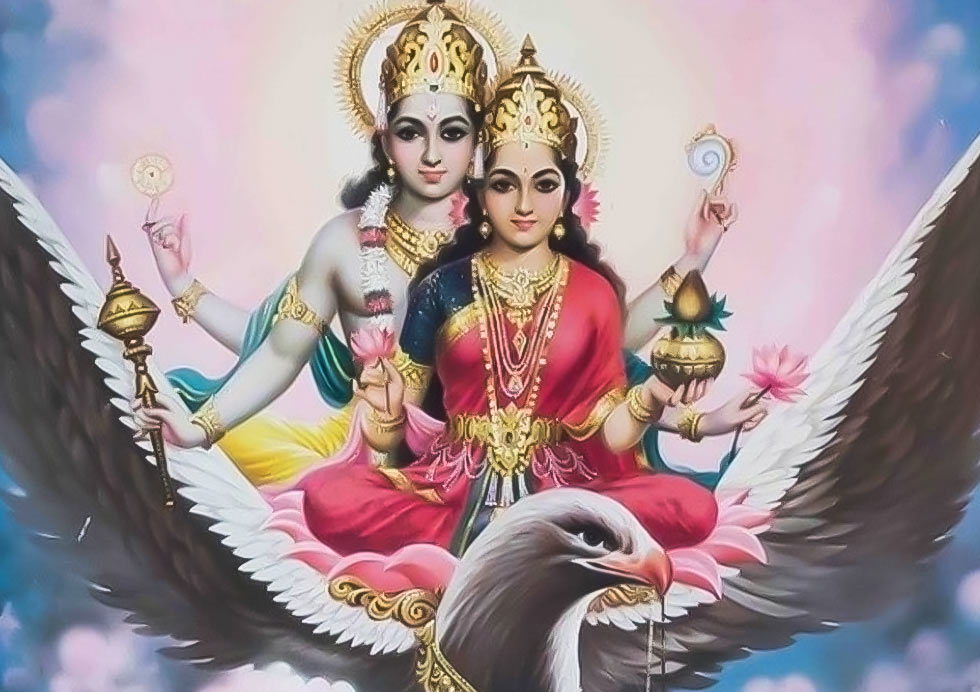
In the Garuda Purana, it's explained that people see Lord Vasudeva (Vishnu) as having both male and female aspects. These two are not separate; they are deeply connected. If the female aspect were separate, she wouldn’t reflect the nature of the male aspect. So, the female energy is an essential part of the male. Together, they show the true nature of the divine. This idea emphasizes that Lakshmi is always part of Vishnu, reflecting his essence.
Lakshmi Devi in Shri Suktam
Shri Suktam is a sacred hymn dedicated to Goddess Lakshmi, found in the Rigveda. It beautifully praises her divine qualities and invokes her blessings for wealth, prosperity, and well-being. Recited with devotion, this hymn reflects deep reverence for the goddess, celebrating her role as the source of abundance and spiritual richness in our lives. Through its verses, devotees express their gratitude and seek her grace to enhance their lives and the world around them.
श्रीमन्मन्दकटाक्षलब्ध विभव ब्रह्मेन्द्रगङ्गाधराम् ।
त्वां त्रैलोक्य कुटुम्बिनीं सरसिजां वन्दे मुकुन्दप्रियाम् ॥२८॥
Meaning:
By Obtaining Whose Grace through Her Beautiful Soft Glance, Lord Brahma, Indra and Gangadhara (Shiva) become Great,
O Mother, You blossom in the Three Worlds like a Lotus as the Mother of the Vast Family; You are Praised by All and You are the Beloved of Mukunda.
Shri Suktam verse 23]
वर्षन्तु ते विभावरि दिवो अभ्रस्य विद्युतः ।
रोहन्तु सर्वबीजान्यव ब्रह्म द्विषो जहि ॥२३॥
O Mother, may Your radiant grace illuminate us like lightning in a stormy sky.
Elevate all the seeds of diversity to a higher spiritual realm; O Mother, You embody the essence of Brahman and are the vanquisher of all hatred.
Sri Lakhsmi in Kurma purana, chapter 1
सैषा सर्वजगत्सूतिः प्रकृतिस्त्रिगुणात्मिका।
प्रागेव मत्तः संजाता श्रीकल्पे पद्मवासिनी॥ ३८॥
She is the mother of all the Universe. She is Prakrti consisting of three Gunas (viz, Sattva, Rajas and Tamas ). Even in the previous Kalpa, she is born of me already. She is Sri, the lotus-dweller.
She is the mother of all the Universe. She is Prakrti consisting of three Gunas (viz, Sattva, Rajas and Tamas ). Even in the previous Kalpa, she is born of me already. She is Sri, the lotus-dweller.
Lakshmi Devi is the Feminine Form of Sri Vishnu
It's impossible to describe Lakshmi Devi, her glory is infinite. She is the feminine form of Shri Vishnu, representing his divine power. As Prakriti, she is the source of all creation, and it is through her that the entire universe came into existence. Her essence is integral to the cosmic balance, reflecting the nurturing and sustaining force of the divine.
Conclusion
In Sri Vaishnavism Tradition Lakshmi Devi holds an unparalleled position as the embodiment of divine energy and the consort of Lord Vishnu. Her presence is not merely that of a goddess of wealth; she represents the profound interconnectedness of material and spiritual abundance. Through the sacred texts and hymns dedicated to her, we see her as the nurturing force that sustains all life and guides devotees on their spiritual journeys.
Lakshmi Devi's infinite glory and essential role as the Shakti of Vishnu highlight the balance between creation and preservation, prosperity and wisdom. As we honor her, we are reminded of the importance of cultivating both material well-being and spiritual richness, reflecting her qualities in our own lives. By embracing her teachings, we can strive to live like the lotus—grounded in the material world yet untouched by its distractions, ultimately reaching for the divine lotus feet of Maa Lakshmi. Through her grace, may we find the strength and guidance to fulfill our goals, nurture our spiritual growth, and foster a deeper connection with the divine.
Lakshmi Devi's infinite glory and essential role as the Shakti of Vishnu highlight the balance between creation and preservation, prosperity and wisdom. As we honor her, we are reminded of the importance of cultivating both material well-being and spiritual richness, reflecting her qualities in our own lives. By embracing her teachings, we can strive to live like the lotus—grounded in the material world yet untouched by its distractions, ultimately reaching for the divine lotus feet of Maa Lakshmi. Through her grace, may we find the strength and guidance to fulfill our goals, nurture our spiritual growth, and foster a deeper connection with the divine.

